Girls Experience Electrical Engineering First-Hand at the 2016 GLEE GAMES Camp
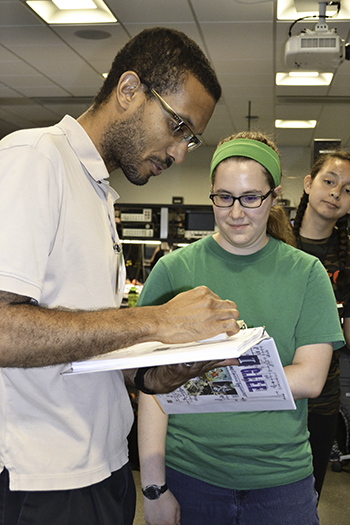
GLEE camp Coordinator, Lynford Goddard (left), works with a camper building her circuit.
July 6, 2016
During the 2016 edition of the GLEE (Girls Learning Electrical Engineering) G.A.M.E.S. (Girls' Adventures in Mathematics, Engineering, and Science) camp, the week of June 19th–25th, 19 campers from across the US (and even one international student) not only got their heads around what Electrical and Computer Engineering (ECE) is like...they got their hands around it too. First they learned about a range of things related to ECE, like circuits, signal processing, imaging, optics, antennas, etc., then implemented what they had learned in the classroom via some hands-on projects. The idea of the camp was to expose the girls to a variety of activities that would give them a taste of what Electrical and Computer Engineering is all about.
First offered the summer of 2010, GLEE, run by Electrical and Computer Engineering (ECE) professor Lynford Goddard, was in its seventh year. The 19 participants were mostly from around the state of Illinois, along with several from California, one each from Tennessee, New York, and even one from Taiwan. According to Goddard, this year’s girls had “a wide variety of interests and background, in terms of the courses that they have taken.”
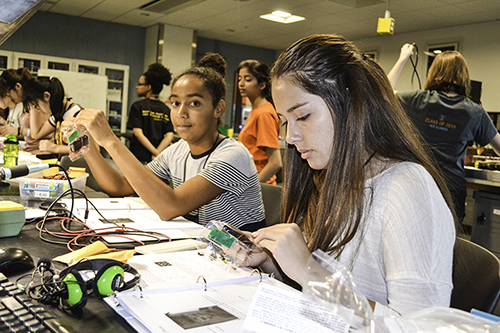
GLEE GAMES campers hard at work building their radio phone circuits.
A number of the camp's activities were related to something most teenage girls are never without…their cell phones. The activities were designed to help them understand some of the principles that make cell phones work. For example, the girls built a “radio phone” (an FM transmitter circuit), which included learning to solder. In the circuit the girls built, they learned about how one’s voice gets transmitted into a voltage signal, gets amplified, then gets radiated through the antenna. The girls also built an LED (light-emitting) calculator that can add numbers as high as 3 + 3…and display it with light.
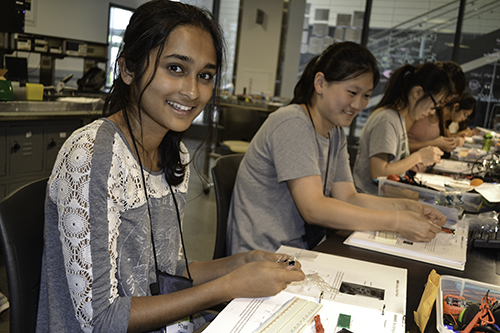
GLEE campers hard at work building radio phones.
Some of the classes in which the girls participated involved a broad range of subjects: power and energy, optics, algorithms, nanotechnology, and solar cells, which included a lab during which the girls tested some solar cells.
In addition, the girls toured some key university buildings: during a tour of MNTL (the Micro Nanotechology Lab) they got to experience its cleanroom lab; plus they did a tour of Beckman Institute.
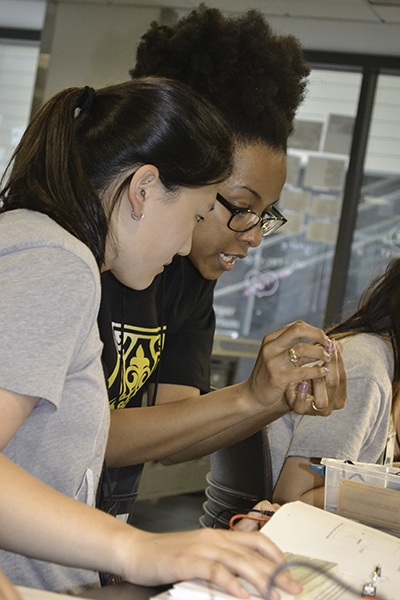
ECE grad student Lonna Edwards (right), works with a camper during the session on building their radio phones.
Why does Goddard run a camp for teenage girls every summer? He says he wants to pay it forward:
“So I think it’s mainly thinking about the opportunities I had when I was going through undergraduate and graduate school, and the people who were influential in my decision to choose a career in engineering and science. So being able to give that back to the next generation is important to me.”
Did Goddard see any future engineers? “Oh, of course…They’re definitely motivated and just kind of seeing what they are interested in, and tailoring activities to match their interests is an important part. But, yea, I definitely do see people who are going to be very strong engineers in the future.”
Goddard is quick to acknowledge the students and colleagues who helped with GLEE.
"This camp couldn’t have been put on without the help and the support from the department; the college; women in engineering, who are handling all of the logistics for the dorms and the activities and so forth; and also the camp staff. We have two counselors, two grad assistants, four lab assistants who help out with all our programs.” He also praised the ECE folks who helped with the camp: Yu-ting Chen, who gave a lecture on Digital Circuits; Xiuling Li, who talked about nanotechnology; and Dane Sievers, who gave the girls a tour of the cleanroom lab, to name a few.
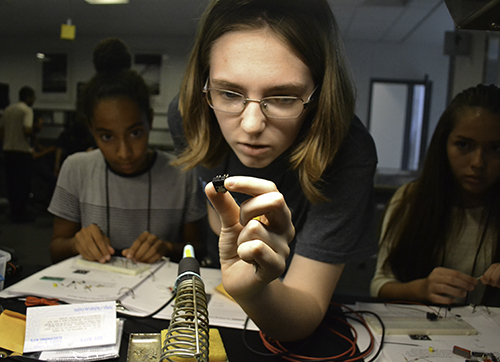
Illinois sophomore, Elaine Houha (center) helping out with GLEE GAMES camp examines the work of one of the campers.
One GLEE lab assistant was Elaine Houha, a rising sophomore in Computer Engineering, who was on hand to help the campers with soldering, wiring, and debugging their projects. Like Goddard, Houha also wanted to "pay it forward." A three-time GAMES alumnus, she hoped to possibly influence some of the girls just as she was when she participated in GAMES:
"When I was in high school I did the Civil, Computer Science, and Aerospace GAMES camps. I wanted to give back and hopefully give the campers the same experience I had when I went to GAMES."
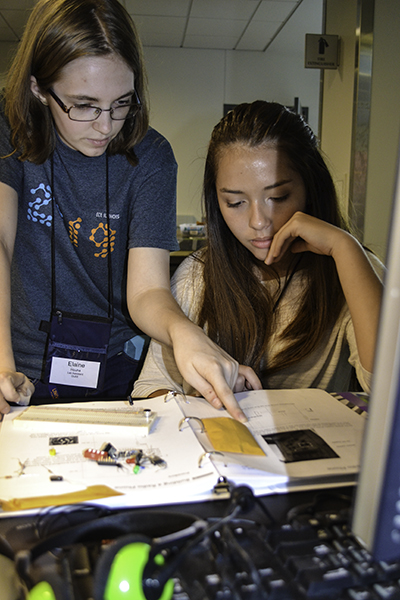
Elaine Houha explains a step to one of the GLEE participants working on her radio phone.
Houha was also excited to expose the girls to some of the cool things in her field and to make the week a memorable experience for them:
"I believe the camp had a positive impact on the campers because they got to see various labs, hear about some of the amazing research being done in Electrical Engineering. Being able to live on campus and use the equipment many students use during the year to build their own projects is something that stays a memory for a long time."
Like Goddard, Houha also thinks there were some future engineers...who may end up studying at Illinois:
"I would love to see any of the campers become an engineering student either at Illinois or another engineering school. I didn't solidify my career path as an engineer until the middle of junior year of high school, despite attending the camp three times. A lot of the campers were very curious about their possible chances of getting into the engineering college, so I think a decent number will probably apply and pursue the path of becoming engineers. They all asked questions during lab, and were genuinely curious to how certain chips or parts worked beyond the explanation that was given. That's the mark of a future engineer, the ability to question and wonder—in my mind at least."
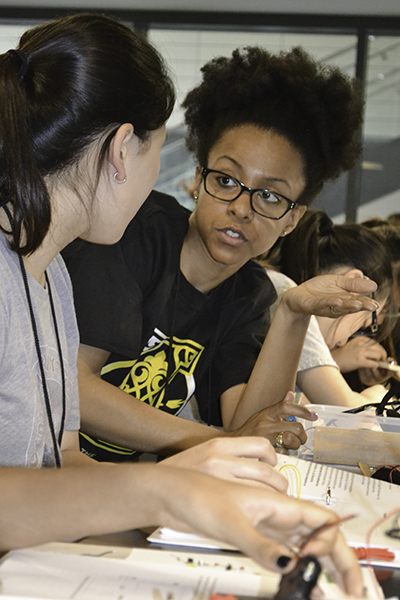
ECE MS/PhD student Lonna Edwards explains an electrical engineering principle to one of the GLEE campers.
Also helping out as a lab assistant was ECE MS/PhD candidate Lonna Edwards. Edwards helped the girls understand fundamental concepts taught during the week and was also on hand to help them troubleshoot issues that they faced during experiments.
Edwards says she participated in GLEE hoping to recruit more girls into her field. "I am always interested in encouraging students who are underrepresented in a particular field, such as ECE, to 'give it a shot.' Many times, students avoid majors that society deems as difficult because they don’t believe that they have the skills to do well in that area. I want the girls to understand that the ability to become an engineer isn’t really a question of whether they are intelligent enough to do so, but rather a question of whether engineering interests them enough to ignite a desire to stick to it."
Edwards believes the girls, besides having fun, experienced a sense of accomplishment. "I think that GLEE camp helped the girls see that although electrical engineering involves difficult concepts, it can be fun to learn, especially when the hard work pays off and an experiment works. I think that GLEE camp also helped them learn the importance of perseverance."
Did Edwards see some future engineers? "I am not certain whether they will all become engineers," she adds. "However, I do think that the girls realize that becoming an engineer is an option, if they really want it."
Story and photos by Elizabeth Innes, Communications Specialist, I-STEM Education Initiative.
More: 8-12 Outreach, GAMES, GLEE, Electrical and Computer Engineering, Summer Camp, Women in STEM, 2016
For additional I-STEM articles about 2016 G.A.M.E.S. camps, see:
- Rosado Continues to Improve Engineering Camps, Grow the STEM Pipeline to Illinois
- AERO G.A.M.E.S Campers Soar with New Aerospace Knowledge
- At G-BAM GAMES Camp Girls Learn They Can Make a Difference Via Engineering
- G.A.M.E.S. Campers Learn about Bioengineering While Breaking Down Stereotypes
- High School Girls Discover Chemical & Biomolecular Engineering at GAMES Camp
- MechSE's WYSE Camp Helps High School Students Explore Mechanical Engineering
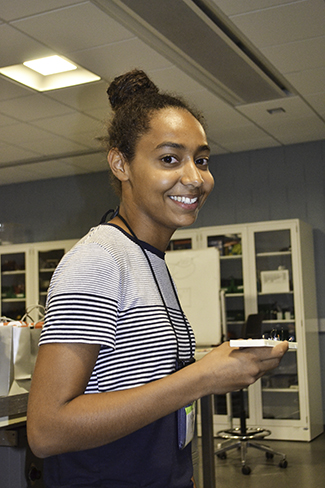
A 2016 GLEE GAMES camper waits to test her radio phone.
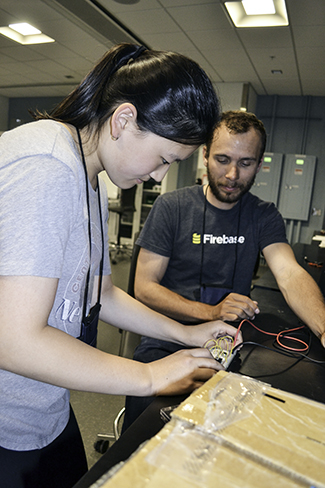
A 2016 GLEE GAMES camper testing her radio phone.
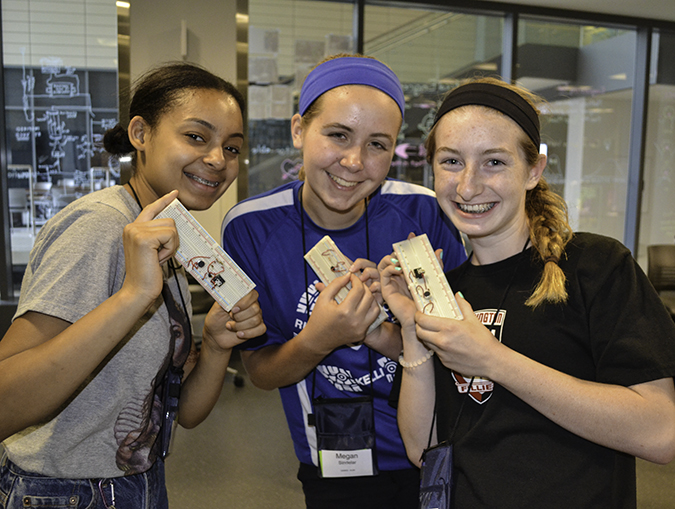
GLEE campers show off their radio phone circuits.













.jpg)
















